Home Tags Posts tagged with "vladimir putin"
vladimir putin
Barack Obama made fun of his healthcare policy, his political opponents and Vladimir Putin at this year’s White House Correspondents’ Association dinner.
The healthcare policy has serious IT issues, prompting the joke: “In 2008 my slogan was: <<Yes we can>>. In 2013 my slogan was: <<Control-alt-delete>>.”
Barack Obama ridiculed media commentators for their apparent obsession with Vladimir Putin’s bare chest.
Dozens of celebrities, journalists and politicians were at the dinner.

Barack Obama made fun of his healthcare policy, his political opponents and Vladimir Putin at this year’s White House Correspondents’ Association dinner
The roll-out of healthcare.gov, Barack Obama’s main policy initiative of his second term, provided much of the humor.
The president made several references to computer malfunctions.
“Does anybody know how to fix this,” he asked, pretending that the overhead projector had failed to work.
Health Secretary Kathleen Sebelius, who quit as a result of the IT issues, stepped up and said: “I got this. I see it all the time.”
The president used Vladimir Putin as a way of lampooning some conservative commentators and political opponents.
“Last year [conservative commentator] Pat Buchanan said Putin is headed straight for the Nobel Peace Prize… to be fair they give those to just about anybody these days. So it could happen,” he said.
Barack Obama was given the award in 2009 having been nominated for it after less than two weeks in office.
“[Republican] Mike Huckabee and [conservative commentator] Sean Hannity keep talking about his bare chest, which is kind of weird.”
The annual WHCA Dinner is traditionally used by presidents to ridicule their opponents, but also laugh at themselves.
[youtube 2HFLwotYfl0 650]
Former German Chancellor Gerhard Schroeder has been photographed hugging Russian President Vladimir Putin while celebrating his birthday in St. Petersburg, despite the imposition of more Western sanctions on Russia.
Gerhard Schroeder has long had close ties to Vladimir Putin and runs a pipeline venture bringing Russian gas to Germany.
Their embrace was photographed as Gerhard Schroeder celebrated his 70th birthday.
Gerhard Schroeder held his Russian party as NATO states accused Russia of helping pro-Putin militias in eastern Ukraine.
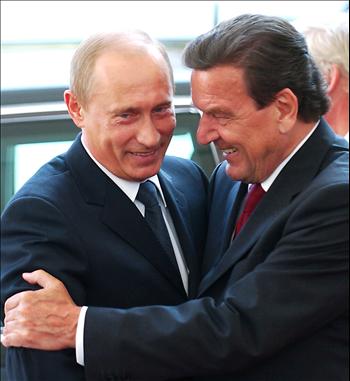
Gerhard Schroeder has long had close ties to Vladimir Putin and runs a pipeline venture bringing Russian gas to Germany
Russia’s state monopoly Gazprom pumps gas to Germany via the Nordstream pipeline under the Baltic Sea, and Gazprom chief executive Alexei Miller was reportedly among Gerhard Schroeder’s guests at the Yusupov Palace in St Petersburg.
Three German officers are among seven military observers from the Organization for Security and Co-operation in Europe (OSCE) currently held captive by pro-Russian rebels in eastern Ukraine. The German government has demanded their release.
The OSCE sent in unarmed observers after the rebels seized Ukrainian official buildings.
German media commentators criticized Gerhard Schroeder on Tuesday for his closeness to Vladimir Putin.
Vladimir Putin speaks fluent German, having served as a KGB secret service officer in communist East Germany during the Cold War.
Gerhard Schroeder was chancellor from 1998 to 2005. He used to lead the centre-left Social Democrats (SPD), who are now in coalition with Chancellor Angela Merkel’s Christian Democrats (CDU).
Roland Nelles of Spiegel Online said the former chancellor “apparently forgets that one must still act responsibly for one’s country as a former government leader”.
“It would help if the ex-chancellor could use his influence to bring some sense to his friend Putin. Perhaps he is doing that too, but unfortunately you don’t get any sense of that whatsoever. Pity,” he wrote.
In Frankfurter Allgemeine Zeitung another commentator, Thomas Holl, said “the pictures of a laughing Schroeder, being hugged and cuddled by his friend Vladimir in the former tsarist palace, while German army soldiers are held hostage by fanatical Putin admirers, look macabre”.
A senior German government official quoted by Reuters news agency said Gerhard Schroeder “does not represent the German government” and he “left active politics some time ago”.
New US sanctions have been imposed on seven Russian individuals and 17 companies it says are linked to President Vladimir Putin’s “inner circle”.
The White House said the move was a response to “Russia’s continued illegal intervention in Ukraine”.
Those targeted include Igor Sechin, head of oil giant Rosneft, and Sergei Chemezov of the hi-tech firm Rostec.
The announcement comes after the mayor of Kharkiv, a city in eastern Ukraine, was shot and critically wounded.
Hennadiy Kernes was recovering after an operation to repair damage to the chest and abdomen, but his life remained in danger, his office said.
Monday also saw pro-Russian separatists, whom Western nations accuse Moscow of supporting, seize a local government building in Kostyantynivka, a town in the eastern Donetsk region.
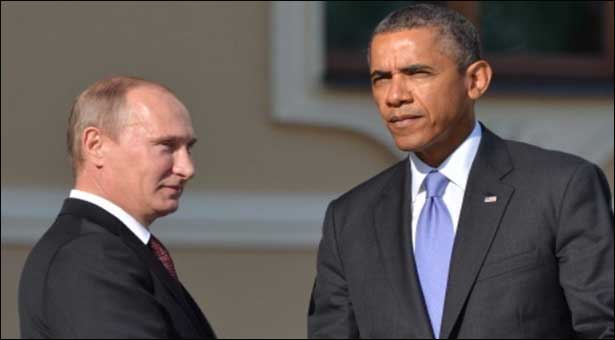
New US sanctions have been imposed on seven Russian individuals and 17 companies
In Donetsk itself, pro-Russian activists armed with clubs and chains attacked a pro-unity rally, correspondents and eyewitnesses said. A number of people were injured in the clash.
Separatists were also continuing to detain about 40 people in the town of Sloviansk, including journalists, pro-Kiev activists and seven military observers linked to the Organization for Security and Co-operation in Europe (OSCE) as well as three members of Ukraine’s security service, officials in Kiev said.
At a special meeting of the OSCE’s permanent council in Vienna, Russian ambassador Andrei Kelin said Moscow was taking “steps” to secure the observers’ release. But the area around Sloviansk was very tense and it had been “extremely irresponsible” to send them there, he added.
The US and EU first imposed visa bans and asset freezes on a number of senior Russian officials and companies after Moscow annexed Crimea from Ukraine last month.
On Thursday, the White House said it was adding to its sanction list “in response to Russia’s continued illegal intervention in Ukraine and provocative acts that undermine Ukraine’s democracy and threaten its peace, security, stability, sovereignty, and territorial integrity”.
It accused Russia of “doing nothing to meet the commitments it made” at a meeting with Ukraine, the US and EU in Geneva on April 17, which it said had included refraining from violence or provocative acts.
Russian Deputy Foreign Minister Sergei Ryabkov said Moscow’s response would be “painful for Washington”.
He told the Interfax news agency that the Kremlin was “disgusted” by the sanctions, which he said showed the White House had “completely lost touch with reality”.
Most of the 17 companies targeted are linked to Arkady and Boris Rotenberg and Gennady Timchenko – individuals targeted in the previous sanctions list.
The latest measures also target some hi-tech exports that “could contribute to Russia’s military capabilities”.
Diplomats in Brussels also said European Union governments had reached a preliminary agreement to impose asset freezes and visa bans on another 15 people as part of expanded sanctions on Russia over its actions in Ukraine. The names are expected to be released on Tuesday, although more could still be added.
[youtube 4X0AVL1omN4 650]
Pavel Durov, the founder of Russia’s most popular social network site VKontakte, says he has been fired and that allies of President Vladimir Putin have taken over his site.
Pavel Durov who ran VKontakte had previously announced he was leaving the company but said he had withdrawn his resignation.
The company denied it had been withdrawn.
Pavel Durov had previously refused requests from the Russian government to censor posts on his site.
In a statement Pavel Durov said that he only found out about the loss of his job from press reports: “Today I was fired as general director of VKontakte. It’s interesting that the shareholders didn’t have the bravery to do this directly, and that I learned about my firing from the press.

Pavel Durov had previously announced he was leaving VKontakte but said he had withdrawn his resignation
“Today VKontakte goes under the complete control of Igor Sechin and Alisher Usmanov. Probably, in the Russian context, something like this was inevitable, but I’m happy we lasted seven and a half years. We did a lot. And part of what’s been done can’t be turned back.”
Igor Sechin is the chief executive of state-owned oil company Rosneft and was Vladimir Putin’s former deputy chief of staff.
Alisher Usmanov, who is the richest man in Russia according to Forbes, made his money in iron ore and steel and until recently held a stake in Facebook. He has a large shareholding in VKontakte via his internet company Mail.ru.
Pavel Durov announced his resignation publicly on April 1st but two days later said it was an April Fool’s joke.
The Russian news agency Interfax reported that Vkontakte said they had acted on Pavel Durov’s resignation letter of March 21 as he had not withdrawn it officially within an allowed one-month grace period.
In an interview with news website TechCrunch, Pavel Durov said he was no longer in Russia and had no plans to return.
“Unfortunately, the country is now incompatible with internet business at the moment.
“I’m afraid there is no going back [to the company], not after I publicly refused to co-operate with the authorities. They can’t stand me,” he said.
VKontakte has more than 100 million users and had been subject to several government requests for information.
Pavel Durov had been asked by the Russian authorities to hand over the details of Ukrainians who had used the site to create groups related to anti-government protests. He was also asked to close down a group that supported Russian opposition leader Alexei Navalny.
He refused the request and said he sold his shares in the company so that he could continue “to make the right decisions”.
“I have a clean conscience and ideals that I am willing to defend,” Pavel Durov said in a post at the time.
Reports suggest that a replacement for Pavel Durov will be elected at the next VKontakte board meeting.
[youtube BsB1nEGE-8M 650]
Russia’s President Vladimir Putin has said he has “a right” to send troops into Ukraine but hopes he will “not have to exercise that right”.
Vladimir Putin was speaking live on Russian TV after a clash in Mariupol, eastern Ukraine, in which three pro-Russian protesters were reportedly killed.
He said he hoped the crisis would be resolved through dialogue.
Talks have opened in Geneva between Russia, Ukraine, the EU and US – the first since unrest erupted in Crimea.
In his annual live television phone-in, Vladimir Putin warned the Ukrainian authorities of “the abyss they’re heading into” and urged dialogue.
Vladimir Putin also admitted for the first time that Russian forces had been active in Crimea, which was annexed by Moscow last month. Previously he had insisted that the camouflaged, masked gunmen who took over Crimea were a local “self-defense” force.
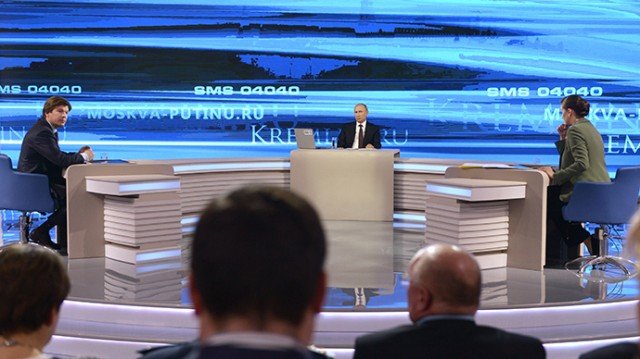
In his annual live television phone-in, Vladimir Putin warned the Ukrainian authorities of “the abyss they’re heading into” and urged dialogue (photo RT)
The West says Russia is aiding the pro-Russian activists now occupying dozens of official buildings in Ukraine’s eastern Donetsk region.
Vladimir Putin dismissed as “rubbish” allegations that Russian special forces were operating there.
Russian-speakers are a majority in Crimea and Donetsk, where ties to Russia are strong. Vladimir Putin reminded viewers that Tsarist Russia used to call eastern Ukraine “New Russia”.
“The Federation Council [upper house of parliament] granted the president the right to use military force in Ukraine. I really hope that I do not have to exercise that right and that we are able to solve all today’s pressing issues via political and diplomatic means,” Vladimir Putin said.
He said the Kiev government, which had “seized power”, had only spoken to its own appointees in the region, but “not to the people whom locals trust”.
Meanwhile, Ukraine’s State Border Service has been quoted by the Interfax-Ukraine news agency as saying that it is “significantly” restricting entry into the country by adult men from Russia because of the risk of “acts of terror”.
Overnight about 300 pro-Russian separatists attacked a military unit in Mariupol near the Azov Sea, throwing petrol bombs. Troops had opened fire, killing three, Ukraine’s Interior Minister Arsen Avakov said in a post on his Facebook page.
Ukraine has now sent in reinforcements including helicopters. There was no independent confirmation of Arsen Avakov’s statement.
[youtube 3PyEspLz8UQ 650]
[youtube gqmZxRUc00w 650]
President Barack Obama has called President Vladimir Putin urging him to use his influence to make separatists in eastern Ukraine stand down.
The phone call between Barack Obama and Vladimir Putin came as pro-Russian activists continued to occupy buildings in eastern towns.
For his part, Vladimir Putin rejected accusations of Russian interference, calling the reports “unreliable”.
Meanwhile, Ukraine’s acting President, Oleksandr Turchynov, has announced the start of an “anti-terrorist operation”.
He told parliament it had begun in the “north of Donetsk Region” on Tuesday morning and was being conducted “stage by stage, in a responsible and weighed manner”.
The extent of the operation was unclear but unconfirmed reports on Russian media, quoting separatists, speak of Ukrainian armor being on the move near the flashpoint towns of Sloviansk and Kramatorsk.
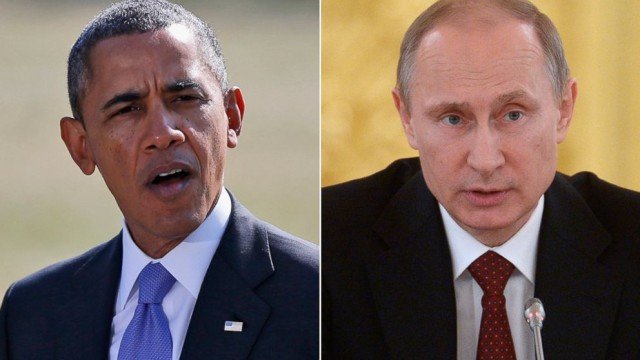
President Barack Obama has called President Vladimir Putin urging him to use his influence to make separatists in eastern Ukraine stand down
Tanks and armored personnel carriers could be seen parked 44 miles from Sloviansk on Monday.
EU foreign ministers say they will expand a list of names targeted by sanctions.
Tension has been steadily rising since Russia annexed the Crimean peninsula, formerly part of Ukraine, last month.
The move, condemned as illegal by Kiev and the West, followed the ousting of Ukraine’s pro-Moscow President Viktor Yanukovych in February.
The White House said the “frank and direct” conversation between the two presidents was made at Russia’s request.
“The president expressed grave concern about Russian government support for the actions of armed, pro-Russian separatists who threaten to undermine and destabilize the government of Ukraine,” a White House statement said.
“The president emphasized that all irregular forces in the country need to lay down their arms, and he urged President Putin to use his influence with these armed, pro-Russian groups to convince them to depart the buildings they have seized.”
The statement also threatened Moscow with wider sanctions, saying “the costs Russia already has incurred will increase if those actions persist”.
The Kremlin said in a statement that recent unrest in Ukraine’s south-east was “the result of the unwillingness and inability of the leadership in Kiev to take into account the interests of Russia and the Russian-speaking population”.
The statement said Vladimir Putin had urged Barack Obama to “use the resources at the disposal of the American side” to help prevent any bloodshed.
It dismissed claims that Russia was interfering in Ukraine, saying the accusations were based on “questionable information”.
Thousands of Russian troops are reported to be deployed along the border between Ukraine and Russia. Kiev fears any crackdown on pro-Russian groups could trigger an invasion.
[youtube mMew-tsSDmU 650]
[youtube F5tujJgi4d4 650]
In a letter to European leaders, President Vladimir Putin has warned Europe that Ukraine’s delays in paying for Russian gas have created a “critical situation”.
Pipelines transiting Ukraine deliver Russian gas to several EU countries and there are fears that the current tensions could trigger gas shortages.
Armed pro-Russian separatists are holed up in official buildings in Donetsk and Luhansk, in eastern Ukraine.
Meanwhile, a European human rights body has stripped Russia of voting rights.
The Parliamentary Assembly of the Council of Europe (PACE) monitors human rights in 47 member states, including Russia and Ukraine.
Protesting against Russia’s annexation of Crimea last month, PACE suspended Russia’s voting rights as well as Russian participation in election observer missions.
The Russian delegation had boycotted the meeting. Its leader, Alexei Pushkov, described the proceedings as a “farce”.
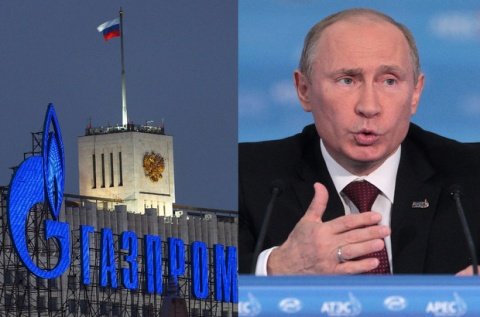
Vladimir Putin has warned Europe that Ukraine’s delays in paying for Russian gas have created a critical situation
Russian state gas giant Gazprom says Ukraine’s debt for supplies of Russian gas has risen above $2 billion (1.4 billion euros).
Gazprom said on Wednesday it could demand advance payments from Kiev for gas but President Vladimir Putin said the company should hold off, pending talks with “our partners” – widely believed to mean the EU.
President Vladimir Putin warned that the “critical” situation could affect deliveries of gas to Europe, his spokesman Dmitry Peskov was quoted as saying.
Vladimir Putin suggested “special” measures, he added, without elaborating. Nearly one-third of the EU’s natural gas comes from Russia.
Previous Russian gas disputes with Ukraine have led to severe gas shortages in several EU countries. The EU says it has extra gas supplies and reverse-flow technology to deal with any such disruption now.
In Kiev, the authorities said Ukraine would not prosecute pro-Russian activists occupying official buildings in Donetsk and Luhansk if they surrendered their weapons.
Ukraine has accused Russia of stirring up the unrest, a claim Moscow denies.
NATO says up to 40,000 Russian troops are massed near Ukraine’s border.
Ukraine fears that the Russian separatist actions are a provocation similar to the protests that gripped Crimea days before Russian troops annexed the peninsula last month.
The separatists in the east – a mainly Russian-speaking region with close ties to Russia – are demanding referendums on self-rule. In Donetsk they have declared a “people’s republic”.
Russia, the US, Ukraine and the EU are to hold talks in Geneva next Thursday to try to resolve the impasse, EU diplomats have said.
They will be the first four-way talks since the crisis began.
Russian Foreign Minister Sergei Lavrov told US Secretary of State John Kerry by telephone on Wednesday that the meeting should focus on fostering dialogue among Ukrainians and not on bilateral relations among the participants.
In another development, President Vladimir Putin sacked 14 generals, Russian media report.
It was not immediately clear if the move was a routine step. Russia has some 800 generals in its army alone.
According to the German government, Russia’s President Vladimir Putin has ordered a “partial withdrawal” of troops from the border with Ukraine.
Vladimir Putin informed German Chancellor Angela Merkel of the move in a telephone conversation, according to her office.
Thousands of Russian soldiers are still said to be deployed along the border.
Earlier, Ukraine condemned a visit to Crimea by Russia’s PM Dmitry Medvedev and a delegation of government ministers.
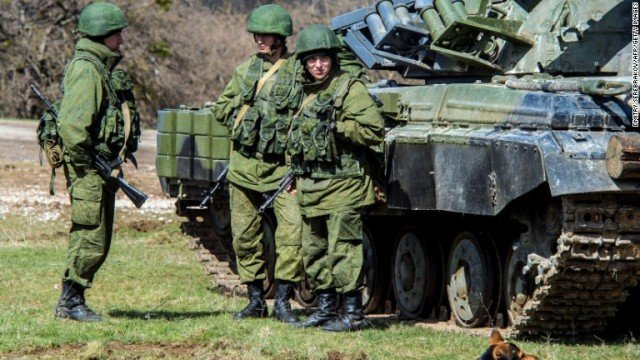
Vladimir Putin has ordered a “partial withdrawal” of troops from the border with Ukraine (photo Getty Images)
A foreign ministry spokesman in Kiev said the highest-level trip to the Black Sea peninsula by officials from Moscow since its annexation by Russia was a “crude violation” of international rules.
A note protesting against the presence of an official in “the territory of another state without preliminary agreement” had been sent, he added.
Crimeans voted to leave Ukraine for Russia on March 16, in a referendum condemned as illegal by the UN General Assembly.
Dmitry Medvedev announced that he would make Crimea a special economic zone, with tax breaks and reduced bureaucracy to attract investors.
He also vowed to quickly boost salaries and pensions, and to improve education, healthcare and local infrastructure.
Tensions between Russia and the West rose after the overthrow of pro-Kremlin Ukrainian President Viktor Yanukovych in February, following months of street protests.
Russia’s subsequent decision to annex Crimea triggered a crisis in relations.
A Kremlin statement did not mention a partial withdrawal, but said Vladimir Putin and Angela Merkel had discussed “opportunities for international support for the restoration of stability” in Ukraine.
Vladimir Putin had also told Angela Merkel that Ukraine had to enact constitutional reforms to ensure that the interests of all its regions were respected, and called for measures to end the “blockade” of Trans-Dniester, the statement added.
[youtube EudSB5lVccg 650]
Russian President Vladimir Putin has called President Barack Obama to discuss the US proposal for a diplomatic solution to the crisis in Ukraine, the White House announces.
Barack Obama suggested that Russia put a concrete response in writing, his spokesman said in a statement.
According to the Kremlin, Vladimir Putin suggested examining how the situation could be stabilized.
Russia’s annexation of Crimea has sparked international condemnation.
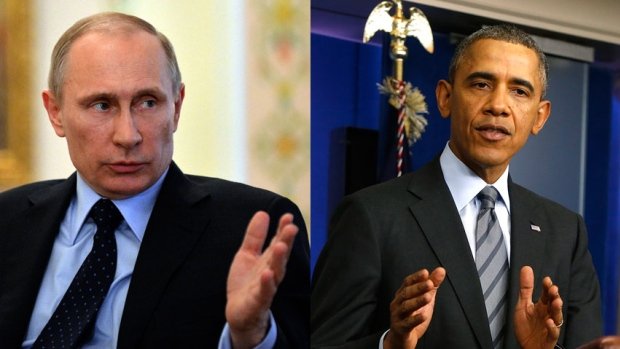
Vladimir Putin has called Barack Obama to discuss the US proposal for a diplomatic solution to the crisis in Ukraine
Barack Obama urged Vladimir Putin to avoid the build-up of forces on the Russian border with Ukraine.
The White House said the two countries’ foreign ministers would meet soon to discuss the next steps.
The US proposal was developed in consultation with Ukraine and other European countries.
Barack Obama received Vladimir Putin’s call in Saudi Arabia – the latest leg of a trip which also took him to Europe where the Ukraine crisis dominated discussions.
The Kremlin said in a statement that Vladimir Putin drew Barack Obama’s attention to “the continued rampage of extremists” in Kiev and various regions of Ukraine.
Vladimir Putin suggested examining possible steps the global community could take to help stabilize the situation, the Kremlin statement said.
Meanwhile in New York, the UN Secretary General Ban Ki-moon said he had been assured by Vladimir Putin that the Russian leader “had no intention to make any military move”.
Russia’s reported troop movements near Ukraine’s eastern border – described as a “huge military build-up” by NATO – has triggered fears that Vladimir Putin’s interest in Ukraine is not limited to Crimea.
Russian President Vladimir Putin has signed a law formalizing the takeover of Crimea from Ukraine, despite fresh sanctions from the EU and the US.
The EU’s latest measures target 12 people involved in Russia’s annexation of Crimea.
Earlier, Ukraine and the EU signed an accord forging closer political ties.
Separately, the Organization for Security and Co-operation in Europe (OSCE) has agreed to send monitors to Ukraine, after Russia dropped objections.
The six-month mission will initially consist of 100 international civilian monitors, who will be employed in nine regions of Ukraine – including the south-eastern areas rocked by violence between pro-Ukraine and pro-Russian activists.
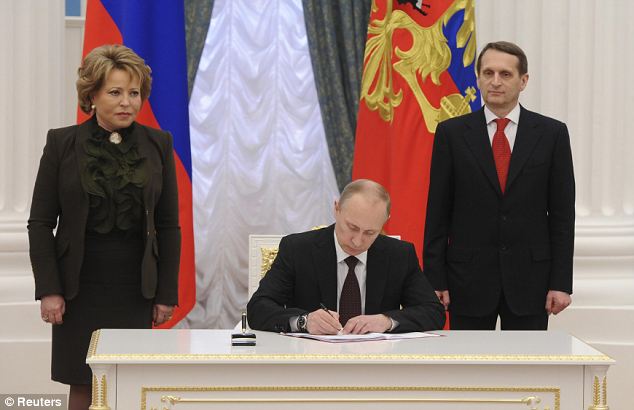
Vladimir Putin has signed a law formalizing the takeover of Crimea from Ukraine (photo Reuters)
The observers will not go to Crimea but German Foreign Minister Frank-Walter Steinmeier said the decision was “a step that helps to support our de-escalation efforts”.
Western diplomats had blamed Russia for several failed attempt to agree such a mission to help defuse the tense situation.
In Brussels, EU leaders also said they would step up efforts to reduce energy dependency on Russia.
The EU’s new sanctions add to an existing list of 21 officials affected by travel bans and asset freezes.
They include Deputy PM Dmitry Rogozin and two close aides of Vladimir Putin, Sergei Glazyev and Vladislav Surkov.
The speakers of Russia’s two houses of parliament, Valentina Matviyenko and Sergei Naryshkin – both at Vladimir Putin’s side as he signed the Crimea law – are also included.
While the list targets several figures close to the Russian president, it does not hit his inner circle as hard as the sanctions announced by the US on Thursday.
[youtube brcB31AncIA 650]
MasterCard and Visa have decided to block credit card services to some Russian bank customers as a result of US sanctions.
Four banks are so far affected, all of which have links to Russians blacklisted by the US.
Visa and MasterCard are forbidden from having any dealings with those targeted by the sanctions.
The banks, which said card services stopped without warning, have described the move as unlawful.
One of the banks affected, Bank Rossiya, is described by the US as Russia’s 15th largest, with assets of $12 billion.
Bank Rossiya has been singled out by Washington as the personal bank for senior Russian officials. US officials said it would be “frozen out” from the dollar.

MasterCard and Visa have decided to block credit card services to some Russian bank customers as a result of US sanctions (photo AFP)
Russian President Vladimir Putin said Bank Rossiya had nothing to do with events in Crimea and promised to transfer his wages there.
“I personally don’t have an account there, but I certainly will open one on Monday,” he told a meeting of Russia’s Security Council.
Vladimir Putin also instructed the Russian central bank to step in, if needed, but the latter said the sanctions on Bank Rossiya did “not have a serious bearing on the lender’s financial stability”.
Visa and MasterCard also confirmed they had stopped providing services to SMP Bank, which is controlled by US-blacklisted brothers Arkady and Boris Rotenberg.
The bank, which is Russia’s 39th biggest with $5 billion in assets, called the actions “illegitimate” because its owners, rather than the bank itself, were the subject of sanctions.
Bank Rossiya’s affiliate banks, Sobinbank and InvestKapitalBank, were also affected.
But Visa said more than 99% of its business in Russia was untouched by sanctions.
Russian shares fell sharply on Friday as investors weighed the impact of western sanctions over Ukraine.
The MICEX index, which is priced in roubles, fell as much as 3% and the RTS, which is priced in dollars fell 3.6%.
Stocks slumped after President Barack Obama said sanctions might be extended to key parts of the Russian economy if Russia took further action in Ukraine.
[youtube flU1H2cvQEc 650]
A Ukraine’s army junior officer has been killed in an attack on a military base in Crimea.
This is the first such death since pro-Russia forces took control in February.
Ukraine has now authorized its troops to fire in self-defense.
The attack came shortly after Russian President Vladimir Putin and the leaders of Crimea signed a bill to absorb the peninsula into Russia.
Western powers condemned the treaty and a G7 and EU crisis meeting has been called for next week in The Hague.
The Ukrainian crisis began in November last year after pro-Moscow President Viktor Yanukovych abandoned an EU deal in favour of stronger ties with Russia. He fled Ukraine on February 22 after protests in which more than 80 people were killed.
According to new reports, armed men arrived in two unmarked vehicles, storming the base in Simferopol and firing automatic weapons.
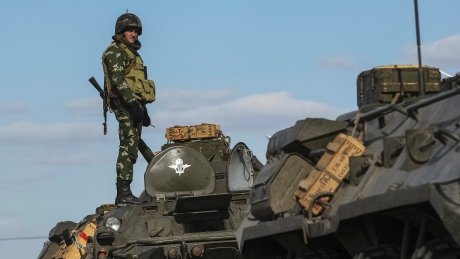
A Ukraine’s army junior officer has been killed in an attack on a military base in Crimea
The Ukrainian government said a junior officer who was on duty in a park inside the base had been killed and another officer injured. A third serviceman had leg and head injuries after being beaten with iron bars, it said.
The government said the commander of the unit was captured by men wearing Russian uniforms.
Defense ministry spokesman Vladislav Seleznyov told Reuters the attack was by “unknown forces, fully equipped and their faces covered”.
The Ukrainians had had their IDs, weapons and money confiscated, he said.
Ukraine’s interim PM Arseniy Yatsenyuk told an emergency government meeting: “The conflict is shifting from a political to a military stage.
“Russian soldiers have started shooting at Ukrainian military servicemen and that is a war crime.”
Reports from the Crimean news agency, Kryminform, said a pro-Russia defense force member had been shot dead.
Crimean police later said both Ukrainian and pro-Russian forces had been fired on from a single location and that one Ukrainian was killed and one injured, and one pro-Russian was killed and one injured.
None of the accounts can be independently confirmed.
Until now only warning shots have been fired amid a truce – but it appears the tension has boiled over and there are fears that further clashes could follow.
Earlier, President Vladimir Putin told Russia’s parliament that Crimea had “always been part of Russia” and in signing the treaty he was righting a “historical injustice”.
[youtube 1FV6-0oKayo 650]
Russian President Vladimir Putin and the leaders of Crimea have signed a bill to incorporate the peninsula into Russia.
Vladimir Putin told parliament that Crimea had “always been part of Russia”.
Kiev said it would never accept the treaty and the US has called a G7-EU crisis meeting next week in The Hague.
After the signing, Kiev said a Ukrainian serviceman had been killed in an attack on a base in Crimea.
The defense ministry said the attack took place in the capital, Simferopol.
US Vice-President Joe Biden, speaking earlier in Poland, said Russia’s involvement in Crimea was “a brazen military incursion” and its annexation of the territory was “nothing more than a land grab” by Moscow.
The Ukrainian foreign ministry said: “We do not recognize and never will recognize the so-called independence or the so-called agreement on Crimea joining the Russian Federation.”
Ukraine’s interim PM Arseniy Yatsenyuk said the Crimea crisis had moved from the political to the military stage.
Germany and France quickly condemned the Russia-Crimea treaty.
Vladimir Putin later appeared before crowds in Moscow’s Red Square, telling them: “Crimea and Sevastopol are returning to… their home shores, to their home port, to Russia!”
He shouted “Glory to Russia” as the crowds chanted “Putin!”

Vladimir Putin and Crimean leaders signs treaty to incorporate the peninsula into Russia
Crimean officials say that, in a referendum held in the predominantly ethnic-Russian region on Sunday, 97% of voters backed splitting from Ukraine.
The EU and the US have declared the vote illegal. Travel bans and asset freezes have been imposed on government officials and other figures in Russia, Crimea and Ukraine, but these have been largely dismissed as ineffectual in Russia.
In a televised address in front of both houses of parliament and Crimea’s new leaders, Vladimir Putin said: “In the hearts and minds of people, Crimea has always been and remains an inseparable part of Russia.”
The referendum had been legal and its results were “more than convincing”, he said.
“The people of Crimea clearly and convincingly expressed their will – they want to be with Russia,” he said, and were no longer prepared to put up with the “historical injustice” of being part of Ukraine.
Vladimir Putin criticized Ukraine’s post-uprising leaders and those behind the unrest, saying they were “extremists” who had brought chaos.
He also praised the “courage, bearing and dignity” of Crimeans, and thanked all Russians for their “patriotic feeling”.
The West, Vladimir Putin said, had behaved “irresponsibly” in backing the uprising, and he denied Russia was interested in annexing more territory.
“Don’t trust those who frighten you with Russia… we do not need a divided Ukraine” he said.
Russia “will of course be facing foreign confrontation,” he said, adding: “We have to decide for ourselves, are we to protect our national interest or just carry on giving them away forever?”
The audience frequently applauded Vladimir Putin at length during his emotionally charged speech, and gave him a standing ovation.
President Vladimir Putin, Crimea’s PM Sergei Aksyonov, the region’s Speaker Vladimir Konstantinov and the mayor of Sevastopol, Alexei Chaliy, then signed a treaty on making the Black Sea peninsula a part of Russia.
Earlier, Vladimir Putin had recognized Crimea as a sovereign state and approved a draft bill on its accession to the Russian Federation.
The bill must now be approved by the constitutional court and then ratified by parliament.
[youtube 7FekTT9EUI8 650]
President Vladimir Putin has formally informed the Russian parliament of Crimea’s request to join the Russian Federation.
This is the first legislative step towards absorbing the peninsula.
Vladimir Putin, who signed a decree on Monday recognizing Crimea’s independence, also approved a draft bill on the accession.
The move comes after a referendum on Sunday in which Crimean officials say 97% of voters backed splitting from Ukraine.
The EU and the US have declared the vote illegal and imposed sanctions.
Travel bans and asset freezes have been imposed on government officials and other figures in Russia, Crimea and Ukraine.
Kiev has appealed to the international community not to recognise the result of the vote, which interim PM Arseniy Yatsenyuk described as a “circus” carried out at gunpoint.
On Tuesday, Arseniy Yatsenyuk said that “for the sake of preserving Ukraine’s unity and sovereignty”, Kiev was prepared to grant “the broadest range of powers” to Ukraine’s other mainly Russian-speaking regions in the south and east, which have seen pro-Moscow protests in recent weeks.
In a pre-recorded address on Ukraine’s 5 Kanal TV – delivered in Russian – Arseniy Yatsenyuk said the reforms would give cities the right to run their own police forces and make decisions about education and culture.
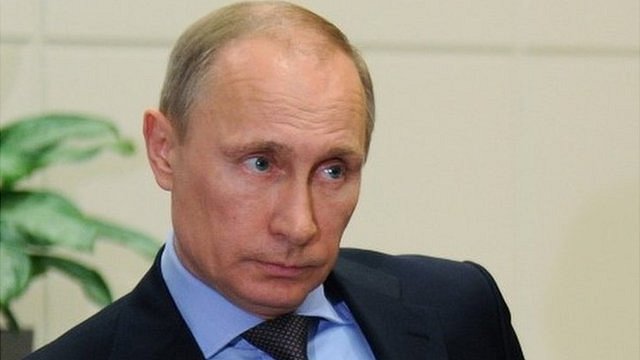
Vladimir Putin has formally informed the Russian parliament of Crimea’s request to join the Russian Federation
Crimea was taken over by pro-Russian forces in late February after Ukraine’s pro-Moscow President Viktor Yanukovych fled to Russia following months of protests.
However, Russia has always insisted the troops are not under its direct control.
Kiev is also concerned about a build-up of Russian troops on its eastern borders, and has authorized the partial mobilization of 40,000 troops.
President Vladimir Putin is due to address both houses of the Russian parliament in a special session at 15:00 local time. A delegation of Crimea’s new leaders is also expected to attend.
Russian news website Gazeta.ru, quoting sources, says that after the speech, President Vladimir Putin and the speaker of the Crimean parliament, Vladimir Konstantinov, are expected to sign an agreement on Crimea’s “entry into the Russian Federation”.
Having approved the draft bill, Vladimir Putin has told lawmakers “to consider it practical to sign the agreement at the highest level,” Russia’s Interfax news agency reports.
Once signed, the bill must be approved by the constitutional court and then ratified by parliament.
The process is likely to be completed this week, after which Crimea is expected to be considered a new part of the Russian Federation, with the status of a republic.
In a sign of the wider impact of the Crimean referendum, parliament in the breakaway Moldovan region of Trans-Dniester announced on Tuesday that it too had appealed to Moscow for the right to join Russia, reports said.
Crimea was transferred from Russia to Ukraine while under Soviet rule in 1954 and much of its population is ethnic Russian.
[youtube ZFmmoUKfV6o 650]
Russia’s President Vladimir Putin has signed a decree recognizing Crimea as a sovereign and independent country.
The new decree is paving the way for Crimea to be absorbed into Russia.
It said it had taken into account Sunday’s referendum in Crimea, in which officials said 97% of voters backed breaking away from Ukraine.
The EU and the US said the referendum was illegal and imposed sanctions on 21 officials from Russia and Ukraine.

President Vladimir Putin has signed a decree recognizing Crimea as a sovereign and independent country
Crimea was taken over by pro-Russian gunmen in late February.
The incursion came after Ukraine’s President Viktor Yanukovych fled to Russia following months of street protests.
The Kremlin officially denies the gunmen are Russian soldiers, but concedes that lawmakers authorized President Vladimir Putin to use force after a formal plea for help from Viktor Yanukovych.
Crimea has been part of Ukraine since 1954, but much of its population is ethnic Russian.
[youtube TrStkcB3xN0 650]
Donald Trump appeared on The Today Show to promote his 2014 Miss USA pageant airing on NBC in June, when the conversation turned to President Barack Obama and his weakness in handling Russia’s actions in Crimea.
“You’ve been critical of the president and his handling of the situation with Ukraine and Crimea,” the show co-host Matt Lauer said.
“I think you said, I’m paraphrasing here, but basically [Russian President Vladimir] Putin was playing with or toying with Obama. That is kind of a common refrain of yours, I should mention.”
Donald Trump replied that others have said the same thing.
“But you always think that Obama is being weak,” Matt Lauer said.
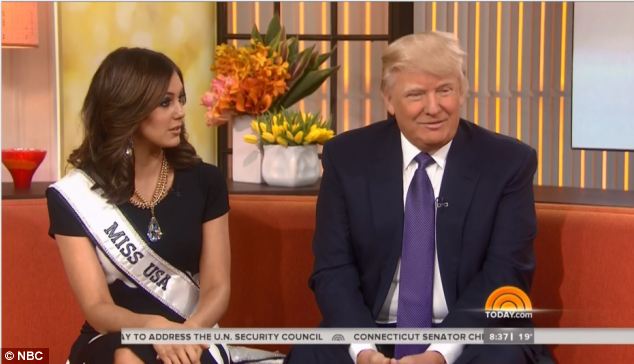
Donald Trump appeared on The Today Show to promote his 2014 Miss USA pageant, when the conversation turned to Barack Obama (photo NBC)
“What would you have done differently than he did in the days before Russian troops went into Crimea?”
The incursion should have never happened, Donald Trump said.
“If you’re the president, that doesn’t happen and it’s not a big surprise,” he said.
“I mean, it should have worked so that a thing like that doesn’t happen.”
The US should be strong in its reaction to Vladimir Putin, Donald Trump said.
“We should definitely do sanctions. And we have to show some strength. I mean, Putin has eaten Obama’s lunch, therefore our lunch, for a long period of time,” he said.
“And I just hope that Obama, who’s not looking too good, doesn’t do something very foolish and very stupid to show his manhood. I just hope that doesn’t happen.”
[youtube kXMkKk2zXbk 650]
According to new reports, Moscow has blocked access to four anti-Putin websites.
Alexei Navalny’s blog, two news sites and one run by Garry Kasparov were blocked on the orders of Russia’s prosecutor general’s office.
In a statement, it said the blocks were imposed because of the sites’ role in helping stage recent illegal protests.
Critics said the blocks were just the latest in a series of moves by Russia’s government to stifle dissent.
The blocks come as Russia’s central bank reported that hackers had targeted its main website. The site, and that of the Kremlin, were briefly unavailable with authorities saying “technical reasons” were making them hard to reach.

Moscow has blocked access to four anti-Putin websites.
Opposition leader Alexei Navalny is currently under house arrest for two months – a punishment imposed for violating the terms of a five-year suspended sentence given after he was tried on charges of embezzlement. The terms of his house arrest demand that he does not receive visitors or use the net.
Anna Veduta, a spokeswoman for Alexei Navalny, said in a tweet that the block was a “political decision taken as part of the cleansing of the media space”.
The block also extends to the Russian news sites Ej.ru and grani.ru as well as the kasparov.ru website.
Alexander Ryklin, editor of the Ej.ru website, said the imposition of the block was “monstrous” and a “direct violation of all the principles of freedom of speech”.
“These sites contain incitement to illegal activity and participation in public events held in violation of the established order,” said a statement from Russia’s state communications monitoring agency Roskomnadzor.
The imposition of the blocks became possible on February 1 after a law drawn up in late 2013 to police sites involved in illegal protests took effect.
It is not clear how successful the blocks will be as followers of Alexei Navalny have widely published details of how to reach the sites and avoid official censorship.
More than 8,000 Russian troops have begun military exercises close to the border with Ukraine.
Russian defense ministry confirmed that artillery such as rocket launchers and anti-tank weapons would also be involved in the exercises.
They come at a time of high tension ahead of Crimea’s referendum on Sunday on whether to join Russia.
Ukraine PM Arseniy Yatsenyuk has told the UN Security Council his country is a victim of Russian aggression.
Arseniy Yatsenyuk said it was “absolutely and entirely unacceptable, in the 21st Century, to resolve any kind of conflict with tanks artillery and boots on the ground”, in reference to Russian troops at key sites in Crimea.
Meanwhile, reports from the eastern Ukrainian city of Donetsk say at least one person has been killed and several wounded in clashes between hundreds of pro- and anti-Moscow demonstrators.
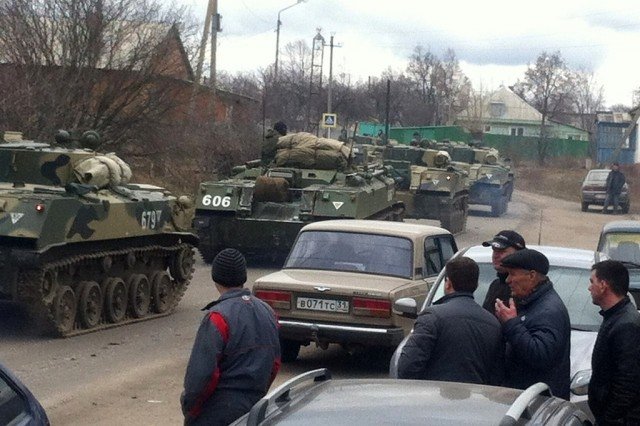
More than 8,000 Russian troops have begun military exercises close to the border with Ukraine
Russia confirmed that military exercises had begun in the regions of Rostov, Belgorod and Kursk, which are close to the border of Ukraine, and would continue until the end of March.
“The main aim… is a multi-faceted check of the units’ cohesiveness followed by the performance of battle training assignments in unfamiliar terrain and untested firing ranges,” the Russian defense ministry said.
In a sign the tension may be spreading, Belarus – a Russian ally – confirmed Moscow had deployed, at its request, extra fighter jets and military transport aircraft after Nato boosted its forces in the neighboring Baltic countries.
Russian President Vladimir Putin told a meeting of his Security Council that this was an inter-Ukrainian crisis that “arose not through our fault, but we are involved in it, one way or another”.
He said he wanted to discuss how to “build relations with our partners and friends in Ukraine and our other partners in Europe and the United States”.
Separately, the Organisation for Security and Co-operation in Europe (OSCE) said Russia had now given its support to a possible long-term monitoring mission in Ukraine.
[youtube vJtXG6FK130 650]
Secretary of State John Kerry has declined an offer of talks with Russian President Vladimir Putin until Moscow engages with US proposals to tackle the crisis in Ukraine.
John Kerry told his Russian counterpart Sergei Lavrov that Moscow’s military intervention in Crimea had made any negotiations extremely difficult.
US officials say there will be little to talk about if the referendum on Crimea’s future goes ahead.
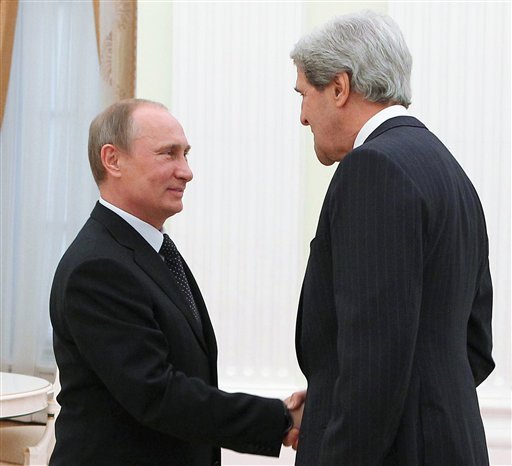
John Kerry has declined an offer of talks with Vladimir Putin until Moscow engages with US proposals to tackle the crisis in Ukraine (photo AP)
The referendum is to be held on Sunday.
Ukraine and the Western countries say that the vote is illegal.
Russia said on Monday it was drafting counter-proposals to a US plan for a negotiated solution to the crisis.
Moscow has condemned Ukraine’s new Western-backed government as an unacceptable “fait accompli” – it says that Russian-leaning parts of the country have been turned into havens of lawlessness.
[youtube EIZgQ-hCNwY 650]
Tens of thousands of Ukrainians have held rival pro-unity and pro-Russian rallies, as Moscow continues to strengthen its grip on Crimea.
Pro-Russia supporters beat up their opponents in Sevastopol, Crimea.
In the eastern city of Luhansk, pro-Russian activists seized regional offices forcing the governor to resign.
German Chancellor Angela Merkel and UK’s PM David Cameron telephoned Russian President Vladimir Putin to urge him to pull back from Crimea. The region is to vote to secede on March 16.
Addressing a huge crowd in Kiev to mark the 200th birth anniversary of national poet Taras Shevchenko, Ukraine’s PM Arseniy Yatsenyuk pledged not to give a “single centimetre” of Ukrainian land to the Kremlin.
Ukraine’s defence minister has said Kiev has no plans to send the army to Crimea.
In the eastern city of Donetsk, pro-Russian protesters take down a Ukrainian flag near the regional government building, replacing it with a Russian flag.

Pro-Russian rally in Simferopol, Crimea
In Kharkiv, also in the east, some 10,000 people reportedly march to support Ukraine’s unity, chanting “No to war!” and “Ukraine, Kharkiv, Crimea!”.
Russia’s ex-tycoon Mikhail Khodorkovsky, who spent a decade behind bars, accuses Moscow of being complicit with Ukraine’s ousted government in using deadly violence against protesters
In Yevpatoriya, western Crimea, pro-Russian forces threaten to storm the command point of a Ukrainian anti-aircraft missile unit if the personnel there do not surrender their weapons.
In Sevastopol, the violence erupted when pro-Russian groups attacked dozens of people guarding a rally to commemorate Taras Shevchenko.
The crowd threw missiles at a car as the activists tried to flee the scene, smashing windows.
Some of the attackers were Russian Cossacks with whips.
The rally was attended by about 200 people.
A rival pro-Russian demonstration was also staged in the city – the base of Russia’s Black Sea Fleet.
[youtube -PnISyZnbBk 650]
President Barack Obama has urged Russian President Vladimir Putin to seek a diplomatic solution to the crisis in Ukraine, in a lengthy telephone call.
In their hour-long conversation, Vladimir Putin said Moscow-Washington relations should not suffer.
Russian troops have taken de facto control of Crimea following the fall of Ukraine’s pro-Moscow President Viktor Yanukovych.
The crisis has led to a boycott by many foreign dignitaries of the Sochi Winter Paralympics, which open on Friday.
Barack Obama stressed to Vladimir Putin that Russia’s actions in Crimea were a violation of Ukrainian sovereignty, the White House said in a statement.
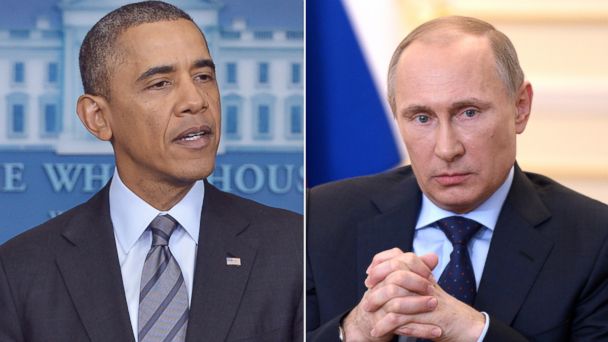
Barack Obama has urged Vladimir Putin to seek a diplomatic solution to the crisis in Ukraine
The US president said there was a solution available that suited all parties, involving talks between Kiev and Moscow, international monitors in Ukraine and Russian forces returning to their bases.
For his part, Vladimir Putin said US-Russian “relations should not be sacrificed due to disagreements over individual, albeit extremely significant, international problems”, the Kremlin said.
It was Barack Obama and Vladimir Putin’s second telephone call concerning Ukraine in less than a week.
It comes after the EU and US joined Ukraine’s government in condemning as “illegal” a move by the Crimea region to set up a referendum to endorse joining Russia.
The Crimean parliament on Thursday said it had decided “to enter into the Russian Federation with the rights of a subject of the Russian Federation” and asked President Putin “to start the procedure”.
Crimea – whose population is mostly ethnic Russian – earlier set a date of March 16 for a referendum on the issue.
[youtube CDRabNhd67I 650]
Crimea’s parliament has voted to become part of the Russian Federation.
The southern Ukrainian region’s parliament said the decision would be put to the Crimean people for their verdict in a referendum on March 16.
A government minister in Kiev said they believe it would be unconstitutional for Crimea to join Russia.
Crimea, a region whose population is mostly ethnic Russian (58.5%), has been at the centre of tensions following the fall of Ukraine’s pro-Moscow president.
Pro-Russian and Russian forces have been in de facto control of the peninsula, which already enjoys a degree of autonomy from Kiev, for several days.
The announcement from Crimea’s parliament comes as EU leaders are meeting in Brussels to discuss how to respond to Russia’s troop deployment on Ukrainian soil.
The Crimean parliament resolved “to enter into the Russian Federation with the rights of a subject of the Russian Federation”.

Crimea’s parliament has voted to become part of the Russian Federation (photo Reuters)
In a statement on its website, parliament said it has asked Russian President Vladimir Putin “to start the procedure” of formally allowing Crimea to join the Russian Federation.
The Kremlin said President Vladimir Putin was aware of developments in the Crimean parliament, but no response has yet been made public.
If Russia agrees to Crimea’s request, the Crimean people will be asked two questions in the March 16 referendum, the statement says.
1. Are you in favor of reuniting Crimea with Russia as a subject of the Russian Federation?
2. Are you in favor of retaining the status of Crimea as part of Ukraine?
Ukraine’s interim Economy Minister Pavlo Sheremeta, speaking in Kiev soon after the announcement was made, said: “We’re not working out what to do if Crimea joins the Russian Federation because we believe it’s unconstitutional.”
[youtube t44HaDJ8v6s 650]
President Vladimir Putin has been nominated for the Nobel Peace Prize despite escalating tensions over sending Russian troops to Ukraine’s Crimea region.
Pope Francis, former NSA contractor Edward Snowden and Pakistani teenager Malala Yousafzai, who was shot by the Taliban, are also on the list.
A record 278 candidates, including 47 organizations, have received nominations for this year’s prize, the Norwegian Nobel Institute’s director Geir Lundestad said.
Committee members met Tuesday to add their own suggestions. They focused on recent turmoil around the globe, including the crisis in Ukraine.
Russia seized control of Crimea after Ukraine’s President Viktor Yanukovich was ousted on February 22. It has led to the most serious confrontation between Moscow and the West since the end of the Cold War in 1991.
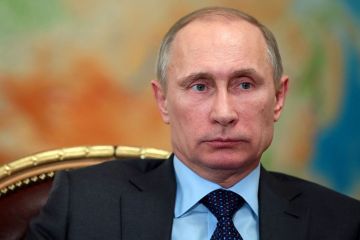
Vladimir Putin has been nominated for the Nobel Peace Prize despite escalating tensions over sending Russian troops to Ukraine’s Crimea region
Geir Lundestad said: “Part of the purpose of the committee’s first meeting is to take into account recent events, and committee members try to anticipate what could be the potential developments in political hotspots.”
Malala Yousafzai, 16, who was shot int e head by the Taliban for campaigning for equal education rights for girls, and Russian dissidents who have spoken out over human rights are also believed to be among the candidates.
The list of nominees also includes Pope Francis and Edward Snowden.
Conflicts between protesters and the governments of Thailand and Venezuela are also expected to be debated by the committee.
“We are getting an increasing number of nominations from people in countries that have never submitted nominations before,” Geir Lundestad said.
The nominations are kept secret for half a century but thousands of people can propose candidates, including members of national assemblies, and many make their choices public.
The committee reduced its list of potential winners to between 25 and 40 on Tuesday and will create a shortlist of about 12 names by the end of April.
The Nobel Peace Prize was first awarded in 1901.
The prize includes 8 million Swedish crowns ($1.15 million) in cash.
Nobel Peace Prize winner will be announced on the second Friday of October and the prize will be presented on December 10, the anniversary of Alfred Nobel’s death.
[youtube PFbtrhCCvKc 650]
Russia says it has test-fired an intercontinental ballistic missile, as tension continues over Ukraine’s Crimea region.
A Topol RS-12M missile was launched from Russia’s Kapustin Yar test range near the Caspian Sea to the Sary Shagan range in Kazakhstan, it said.
It comes after the US accused Russia of an “act of aggression” in Crimea.
The US said it was given advance notice of the missile launch, as required by bilateral arms treaties.
The Topol was fired at 22:10 local time, the defense ministry in Moscow said, adding: “The aim of the launch was to test a promising intercontinental ballistic missile payload.”
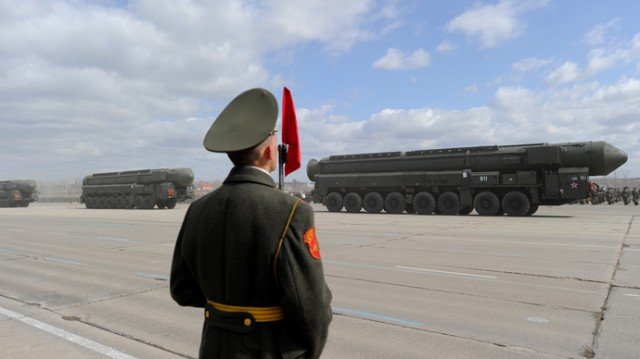
A Topol RS-12M missile was launched from Russia’s Kapustin Yar test range near the Caspian Sea to the Sary Shagan range in Kazakhstan
The nuclear-capable missile reached its target successfully, it said.
Tests of the missile, one of Russia’s newest, are not unusual but the timing of the launch if confirmed, is likely to alarm observers of the crisis with Ukraine.
Moscow is in de facto control of the Crimean peninsula after troops thought to be Russian or pro-Russian took control of strategic points in recent days.
Troops are surrounding Ukrainian military bases and other installations, while two Ukrainian warships are reported to be blocked by a Russian ship in the port of Sevastopol.
Russian President Vladimir Putin has denied the troops are Russian, saying they are “local self-defense forces” loyal to Moscow, protecting the bases from “nationalists” and “anti-Semites”.
Vladimir Putin said Viktor Yanukovych, who was ousted as Ukraine’s president in late February after months of protest, remained the legitimate leader, though he admitted that he had “no political future”.
Kiev and the West have accused Russia of mounting an invasion of Crimea, which has a majority Russian-speaking population.
[youtube Xy_IdjUlRLI 650]
President Vladimir Putin says there is no need yet to send Russian troops into Ukraine, but he has not ruled out doing so.
Russia reserves the right to use “all means” to protect citizens in Ukraine, he told a news conference.
Russian and Ukrainian troops in Crimea are involved in a tense stand-off.
Vladimir Putin called the toppling of Ukraine’s President Viktor Yanukovych in the capital Kiev an “anti-constitutional coup and armed seizure of power”.
The Russian president said “militants” had plunged the country into “chaos”. He also said Ukrainian “nationalists” and “anti-Semites” were roaming the streets of Kiev and other cities.
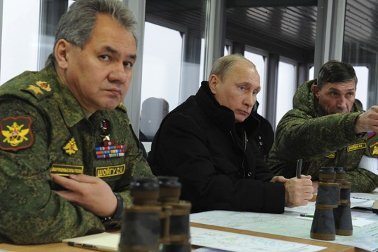
Vladimir Putin says there is no need yet to send Russian troops into Ukraine, but he has not ruled out doing so
If Russian-speaking people in eastern Ukraine asked for Russia’s help then Moscow would respond, he said.
In Crimea pro-Russian armed men and civilians are surrounding Ukrainian military bases – not Russian soldiers, he said.
Viktor Yanukovych had agreed to all that the opposition wanted, Vladimir Putin said.
Vladimir Putin insisted that Viktor Yanukovych was still the legitimate president.
There were only three legal means to remove a president, he said: death, personal resignation or impeachment.
Viktor Yanukovych fled to Russia, and Vladimir Putin told the news conference: “I don’t think he has a political future.”
Russia had helped Viktor Yanukovych for “humanitarian” reasons, Vladimir Putin said, “otherwise he’d just have been killed”.
[youtube qS23Z9HeBb8 650]
 Prev1...8910...14Next
Prev1...8910...14Next  Page 9 of 14
Page 9 of 14

























